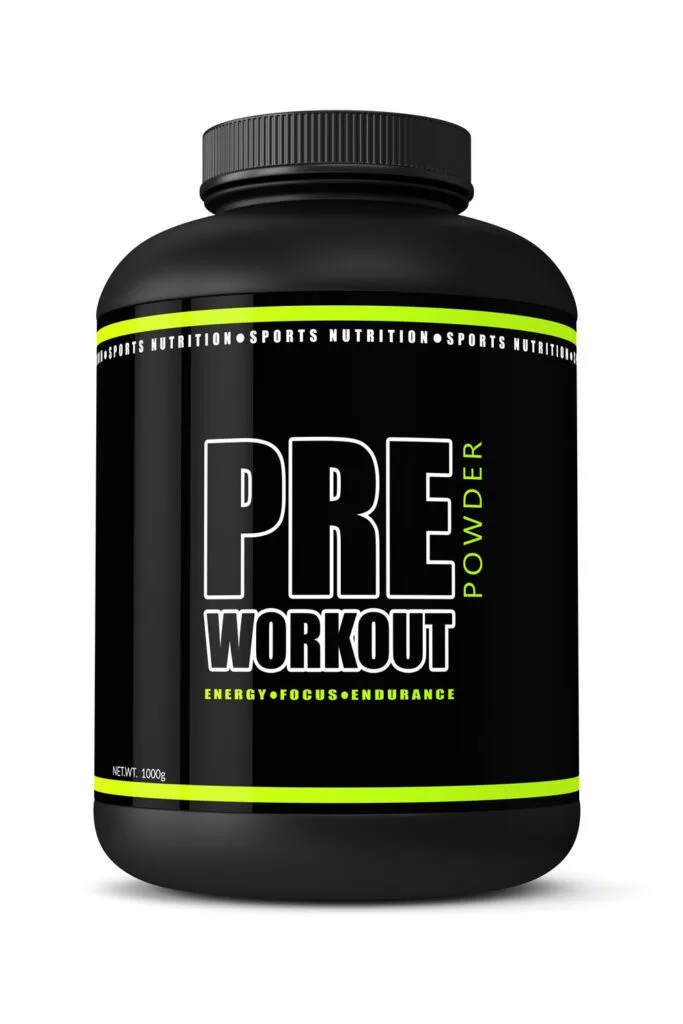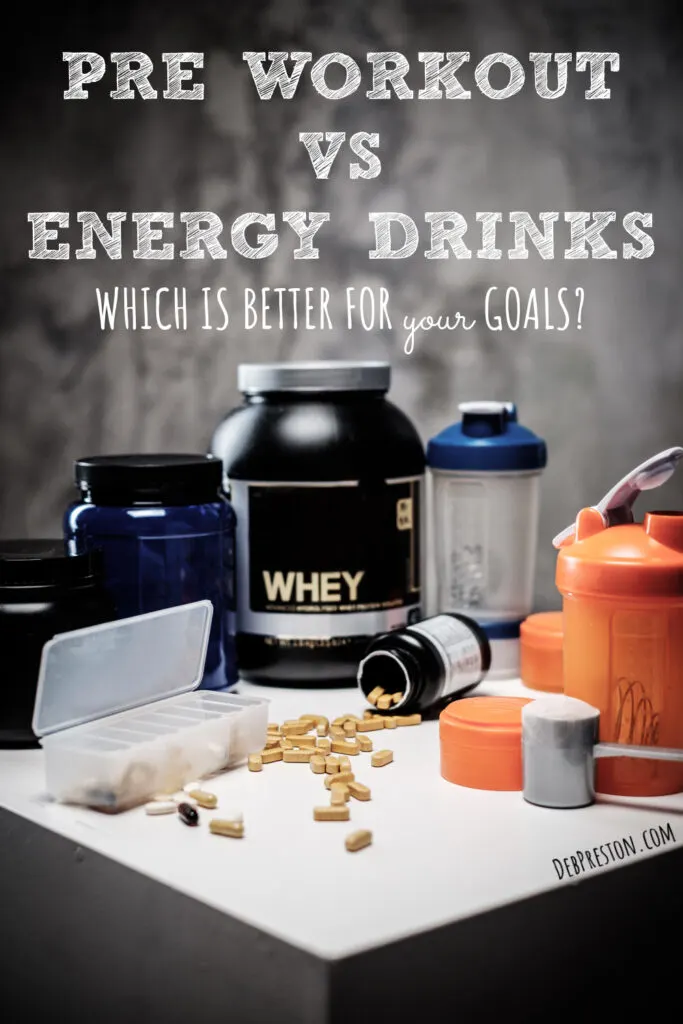I recently re-upped my commitment to morning workouts. I think we can all agree that starting your day with a workout is ideal, right?
But when you start work at 6:00 AM…and so your workout has to start at 4:30 AM…mornings can feel rough. So I made a plan to drink a little energy boost the second my alarm went off in the morning.
My reasoning was that with so much caffeine coursing through my system, it would feel impossible to go back to bed. And knowing that I had paid for that caffeine boost (pre-workout and energy drinks are both pricey!) would push my frugal self into action.
But the pre workout vs energy drinks decision was tough! Both have benefits, both have potential concerns, and we all know that some are much higher quality than others, on both sides.
So what’s your better option for an energy boost…pre-workout or energy drinks? Let’s break it down together.
Defining Pre-Workout and Energy Drinks
Navigating the world of supplements can be tricky, but understanding the specifics of pre-workout and energy drinks can help you choose the right option for your fitness regime.
Pre-Workout Basics
Pre-workout supplements are designed with your workout in mind.
They typically contain a blend of ingredients that aim to increase your energy, improve endurance, and enhance muscle performance during exercise. These supplements employ careful dosing of components such as caffeine, amino acids, and other performance enhancers to ensure they provide maximum benefit during physical activity.
These types of supplements can be found in nutrition shops like GNC, gym pro shops, and online stores.
Energy Drinks Explained
On the other hand, energy drinks offer a more general boost of energy that is not solely intended for workouts. These beverages are often carbonated and contain high levels of caffeine and sugar, along with other energy-boosting compounds.
Compared to pre-workout drinks, energy drinks are usually ready to consume and offer a wider variety in terms of flavor and composition. They’re great for a quick pick-me-up, but their effect may not be as targeted as pre-workouts when it comes to exercise.
Energy drinks are much easier to find, for sale at any local grocery or even convenience store.
Pre Workout vs Energy Drinks: Effects on Exercise and Performance
Fitness enthusiasts know that choosing the right supplement before your workout can impact your performance significantly. Both pre-workouts and energy drinks aim to enhance your exercise performance, but they approach the job differently.
Impact of Pre-Workouts on Athletic Performance
Pre-workout supplements are specifically formulated to boost your athletic performance in your training session.
They often contain ingredients like beta-alanine and creatine, which can lead to increased muscle endurance and muscle strength, respectively. You may find that pre-workout drinks give you the ability to push harder during workouts, potentially leading to strength gains over time.
- Focus: Ingredients like caffeine can improve your mental alertness and focus, crucial for high-intensity training.
- Endurance: Beta-alanine helps in buffering lactic acid, allowing for longer and more effective workouts.
How Energy Drinks Affect Physical Performance
Energy drinks provide a quick and convenient way to consume caffeine, which can improve exercise performance by increasing your energy levels. Their main difference from pre-workout drinks is that energy drinks are not specifically tailored for exercise and may contain high amounts of sugar, artificial sweeteners, and other additives that could cause a crash in energy levels post-workout.
- Energy Boost: Caffeine in energy drinks can enhance your energy temporarily; useful if you need an immediate performance enhancement.
- Physical Performance: The boost from the sugar and caffeine might help you feel more energetic, but the effects can be short-lived compared to the sustained energy release designed in pre-workouts.
Remember, while both options can aid in performance enhancement, it’s important to consider your individual needs and the specific benefits you’re looking for in your workout routine.
Potential Benefits and Goals
When considering pre-workout supplements and energy drinks, you’re looking at two distinct products designed with specific goals in mind. Each offers unique benefits to help you maximize your workout routine and mental function.
Enhancing Workout Efficiency
Pre-workouts typically contain ingredients like creatine and beta-alanine, which are key to increasing your muscular endurance and reaction time during intense exercise.
These components support your muscles in sustaining longer periods of exertion, meaning you can push harder and get more out of each training session. The goal is clear: to enhance your overall workout efficiency by preparing your body for peak performance.
Improving Mental Focus and Alertness
While both pre-workouts and energy drinks offer a boost of energy, energy drinks are particularly geared towards heightening your mental alertness and focus.
Ingredients like caffeine and taurine are stimulants that can sharpen your attention and bolster cognitive function, which is crucial when you need to stay on top of your game both inside and outside the gym. Consistent mental clarity can lead to better workouts, as you’re able to stay concentrated on your fitness goals.
Pre Workout vs Energy Drinks: Side Effects and Health Considerations
When exploring the realm of workout enhancers, fitness enthusiasts should consider the potentially adverse effects and health considerations of pre-workout drinks/supplements and energy drinks. Your choice between the two should be informed by an understanding of how they might affect your body and overall well-being.
Pre-Workout Concerns
Pre-workout supplements are crafted to enhance your exercise performance, but they come with potential adverse effects.
You may experience a tingling sensation due to beta-alanine, a common ingredient. Additionally, too much caffeine can lead to jitters, increased heart rate, and insomnia.
It’s crucial to pay attention to how your body responds, especially if you have high blood pressure. The FDA does not regulate all ingredients in these supplements, so check the label for any substances of concern.
- Common Side Effects:
- Jitters
- Increased heart rate
- Insomnia
- Tingling sensation
- Nausea
Energy Drinks and their Risks
Energy drinks might seem like a quick fix for fatigue, but regular consumption can lead to significant health risks. Overuse may result in dehydration, high blood pressure, and other cardiovascular concerns.
Be mindful of consuming too much caffeine, as it can exacerbate issues like jitters and heart rate irregularities. Always consider your own health conditions and consult with healthcare providers if you are uncertain about how these drinks might affect you.
- Potential Risks:
- Dehydration
- High blood pressure
- Irregular heart rate

Pre Workout vs Energy Drinks: Ingredients and Nutritional Value
When choosing between a pre-workout supplement and an energy drink, it’s essential to consider what’s inside the can or tub. You’ll want to know which ingredients will truly benefit your workout and how they affect your body.
Common Ingredients in Pre-Workouts
Pre-workouts often share a core set of components aimed at enhancing your exercise performance and focus.
Caffeine is a staple ingredient for its ability to increase alertness and delay fatigue. Most pre-workouts will have higher doses of caffeine compared to energy drinks.
- Amino acids: These are the building blocks of protein and play a role in muscle recovery. Beta-alanine is a popular amino acid found in pre-workouts, known to reduce muscle fatigue.
- Creatine: Aids in energy production and is thought to boost muscle strength and power.
- Nitrates, often from beetroot, can improve blood flow and oxygen delivery to the muscles.
In addition to these, you might encounter B vitamins which are crucial for energy metabolism, and other performance enhancers like taurine and ginseng.
Typical Energy Drink Components
Energy drinks cater more to increasing immediate energy and may include:
- A lower dose of caffeine than pre-workouts, which still provides a boost in energy.
- Sugar is common in energy drinks, contributing to a quick spike in energy and taste.
- Taurine, another amino acid, touted to improve mental and physical performance.
- Guarana, a natural source of caffeine, and ginseng, for cognitive function and energy.
Energy drinks also include a variety of B vitamins and amino acids, but often in lower concentrations than pre-workouts. For those who monitor their sugar intake, options with artificial sweeteners are also available.
Pre Workout vs Energy Drinks: Caffeine Content
When you’re deciding between pre-workout supplements and energy drinks, the amount of caffeine they contain can significantly impact your energy levels and performance.
Caffeine in Pre-Workouts
Pre-workouts are often designed to give you a concentrated boost right before exercise.
The caffeine content in pre-workouts can vary widely but typically ranges from about 150 to 300 mg of caffeine per serving. Some pre-workout formulas also include green tea extract, which provides a natural source of caffeine.
It’s essential to read the label, as some pre-workouts may also contain other natural stimulants like guarana, which can further contribute to the total caffeine content.
Assessing Caffeine Levels in Energy Drinks
Energy drinks, on the other hand, tend to have a broader range of caffeine content.
A standard can may have anywhere from 50 to 300 mg of caffeine. Like pre-workouts, energy drinks may also feature ingredients like green tea and guarana, delivering a varied caffeine experience.
Remember that because energy drinks are often consumed throughout the day, not just before exercise, the cumulative caffeine intake might be higher if you drink multiple cans.
Pre Workout vs Energy Drinks: Sugar Content
When evaluating pre-workout supplements and energy drinks, it’s crucial to consider how sugar impacts your body and workout performance. Sugar serves as a fast-acting fuel source, but its quantity and form can vary significantly between these products.
Sugar Usage in Pre-Workout Formulas
Pre-workout supplements might contain sugar, although many aim for low sugar content to prevent a spike and crash in blood sugar levels which can negatively affect your workout.
Formulas often include complex carbohydrates for a sustained energy release. Some may opt to include sugars or artificial sweeteners in moderate amounts to provide immediate energy and enhance taste.
The Sugar Content of Energy Drinks
In contrast, energy drinks typically have a higher sugar content to provide a quick energy boost.
This rapid source of energy from sugars and artificial sweeteners can increase alertness almost instantly. However, you should be aware that a high intake of sugary energy drinks might lead to a quicker drop in energy levels as your body metabolizes the sugar rapidly.
Pre Workout vs Energy Drinks: Usage and Timing
When incorporating pre-workouts or energy drinks into your fitness regimen, timing is crucial to maximize their effectiveness. It’s important to understand when and how to use these supplements to align with your energy needs and fitness goals.
Optimal Use of Pre-Workout Supplements
To get the most out of pre-workout supplements, consume them about 30 minutes before beginning your exercise.
This timing ensures that the active ingredients, typically including caffeine, beta-alanine, and nitric oxide precursors, are absorbed and active in your system just as you start your training session. Once active in your system, a pre-workout drink can enhance blood flow, improve focus, and increase endurance, helping you to push through intense workouts effectively.
Best Practices for Energy Drink Consumption
In contrast, energy drinks like Red Bull can offer more flexibility in their usage.
While they also contain caffeine, they’re generally formulated to offer a quick energy boost and can be consumed at various times. However, to avoid a crash or jitters, it’s advisable to drink them at least one hour before your workout, and not too late in the day.
The main difference from pre-workout drinks is that energy drinks are not specifically tailored for exercise performance, so it’s crucial to adjust your consumption according to your individual tolerance and energy needs.

Varieties and Alternatives
When considering energy boosts for your workout, it’s important to know about the various options available to you. Pre-workout supplements come in several forms and there are numerous alternatives to traditional energy drinks.
Different Forms of Pre-Workouts
Pre-workouts can enhance your exercise performance, but they’re not one-size-fits-all. Here’s a breakdown:
- Powdered Form: Commonly mixed with water, pre-workout powders like C4 and other brands offer a customizable dosage. You can tailor the amount you use based on your body’s response and the intensity of your workout.
- Pre-Workout Supplements: Besides powders, pre-workouts also come in capsules, ready-to-drink formulas, and even chewable options. They typically contain a blend of ingredients such as caffeine, amino acids, and sometimes beetroot extract which can improve blood flow and exercise performance.
Alternative Energy Boosting Options
If you’re looking for an energy boost without relying on conventional pre-workouts, consider these alternatives:
- Energy Drinks: While energy drinks like Red Bull, Bang, and Celsius are popular, remember they are designed to increase energy quickly, often through high caffeine content, and may not provide sustained exercise benefits.
- Natural Alternates: You can opt for natural energy sources, including foods high in B vitamins, omega-3 fatty acids, and antioxidants. For instance, fish is an excellent source of the nutrients needed for sustained energy levels.
- Plant-Based Alternatives: Looking for something plant-based? Beetroot extract is a natural alternative known for its ability to improve endurance and muscle oxygenation during workouts.
Remember to tailor your choice to your workout goals and personal health needs.
Hydration and Its Importance
When you’re considering a boost for your workout routine, hydration should be at the top of your list.
Your body depends on water to function, and when you’re exercising, you need it more than ever. Not only does water help regulate your body temperature, but it also lubricates joints and helps transport nutrients to give you energy.
Dehydration, on the other hand, can be a workout’s worst enemy.
It can lead to fatigue, dizziness, and muscle cramps, making it hard for you to get the most from your gym time. When you drink enough water, you maintain a balance of bodily fluids that aids in digestion, absorption, and even mood improvement.
Here’s a quick guide on staying hydrated:
- Before Exercise: Drink about 17-20 ounces of water 2-3 hours before your workout.
- During Exercise: Aim for 7-10 ounces every 10-20 minutes during your training session.
- Post Exercise: Replenish with 16-24 ounces for every pound lost during exercise.
You might be wondering about pre-workouts and energy drinks. Some pre-workouts contain ingredients that help with hydration, while energy drinks often have caffeine, which may lead to increased urine output and potential dehydration if not consumed in moderation.
Remember, your hydration needs can vary based on the intensity of your workout, the environment, and your own body. Listen to your body, and when in doubt, have some water – it’s the ultimate pre-workout.
Special Considerations for Athletes
When considering what to take before engaging in athletic activities, you should be aware that the choice between pre-workout supplements and energy drinks can impact your performance and eligibility in sports. Each option contains a unique blend of ingredients designed to enhance different aspects of your physical activity.
Performance Enhancers and Athletic Goals
Pre-workout supplements might include ingredients such as creatine monohydrate and nitric oxide precursors, which can aid in improving your muscle endurance and achieving a better muscle pump.
Taking these supplements could help you push your fitness journey to the next level as a gym-goer or athlete. Remember, these compounds are typically dosed with performance enhancement in mind.
- Creatine Monohydrate: Helps enhance power output and increases muscle recovery.
- Nitric Oxide: Aids in delivering oxygen to the muscles, improving recovery time and providing a more significant muscle pump during workouts.
Nootropics, often found in pre-workouts, are designed to promote focus, a clear mind, and potentially improve your reaction times—all essential elements for peak athletic performance.
Regulation and Sports Eligibility
It’s crucial to check the ingredients in both pre-workout and energy drinks against the banned substance list of your sport’s governing body. Understand that not all ingredients are universally accepted, and some might land you in a tricky situation when it comes to sports eligibility.
- Energy Drinks: Often loaded with caffeine, which, if overconsumed, can lead to exceeding allowable limits in some competitive sports.
- Pre-Workouts: May contain substances that are on the watch or banned list by organizations like the World Anti-Doping Agency (WADA).
Prioritize recovery as much as the boost you gain, ensuring that what you consume contributes positively to muscle recovery and keeps you within the regulations of your sport. Always aim to understand the full implications of any supplement use in your athletic career.
Scientific Research About Pre Workout vs Energy Drinks
When you’re deciding whether to use pre-workout supplements or energy drinks, scientific studies offer invaluable insights.
Pre-workout supplements, typically in powder form, are designed to enhance exercise performance. Research highlights their benefits on anaerobic power and muscle strength, especially when consumed before strenuous workouts.
- Study Findings: A study aimed at understanding the effects of pre-workout supplements on performance found that these supplements can enhance your upper and lower body power.
In contrast, energy drinks are often carbonated and contain a mix of caffeine, taurine, and other ingredients. Some studies indicate that energy drinks can improve cognitive levels and physical performance, but with a note of caution regarding their moderate consumption.
- Health Considerations: While both options may provide a boost, bear in mind the potential implications for heart health.
Recent research into multi-ingredient pre-workout supplements calls for a deeper look into their long-term safety and efficacy across different populations.
- Anaerobic Performance: Investigations into the effects of pre-workout formulas on anaerobic performance suggest promise, particularly in resistance-trained men.
- Hydration and Recovery: Additionally, the role of functional beverages, which can include certain energy drinks, extends beyond performance enhancement to hydration and recovery after exercise.
It’s essential to gauge your body’s response and consult healthcare professionals if you’re unsure about which option is right for you.

As for me and my pre workout vs energy drinks dilemma, I decided to give both options a try!
While I preferred the quick boost of Red Bull and Alani energy drinks, I found myself crashing by the time I was starting work. I landed on using Whole Betty Rock and Restore pre-workout because I appreciate the company’s clean ingredients and whole body/whole health approach.
Which side will you take in the pre workout vs energy drinks face-off? Be sure to share your thoughts in the comments!
Frequently Asked Questions About Pre Workout vs Energy Drinks
In this section, you’ll find direct answers to common concerns surrounding pre workout vs energy drinks. Whether it’s about health impacts, usage, or nutritional content, we’ve got the specifics you need.
What are the health implications of choosing pre-workout over standard energy drinks?
Choosing pre-workout over energy drinks can affect your health differently due to the distinct ingredients and concentrations. Pre-workouts often contain a blend targeting enhanced exercise performance, while energy drinks provide a broader energy boost, sometimes with higher sugar content.
Can I use pre-workout supplements for non-exercise related energy boosts?
While primarily designed for exercise, pre-workout supplements can offer an energy lift for other activities. However, they contain ingredients like beta-alanine and creatine, which are specifically aimed at enhancing exercise performance.
What distinguishes pre-workout supplements from traditional caffeine sources like coffee?
Pre-workout supplements generally contain additional performance-enhancing ingredients like amino acids and B vitamins that you won’t find in a cup of coffee, making them tailored for exercise support.
How does the effectiveness of pre-workout compare to that of specialized energy drinks for enhancing athletic performance?
Pre-workout formulas are specifically formulated to enhance athletic performance with ingredients that may increase endurance, strength, and focus, unlike standard energy drinks which primarily provide a quick energy surge through caffeine and sugar.
Are there specific benefits of pre-workout formulas compared to energy drinks such as Celsius?
Unlike general energy drinks like Celsius, pre-workout formulas are crafted to deliver nutrients that support specific exercise demands, which may lead to improved training results and recovery.
Should I consider the nutritional content of pre-workouts versus energy drinks when deciding which to consume?
Yes, examining the nutritional content of pre-workouts versus energy drinks is essential. Pre-workouts may offer tailored nutrients for fitness goals, whereas energy drinks can vary widely in sugar and caffeine content, impacting overall diet and health.

P.S. Ready to take charge of your health, but looking for a totally doable approach? Our free “Get Fit Starter Pack” includes six fantastic resources to help! Get yours free HERE.
Disclosure: While all opinions are our own, we are a participant in the Amazon Services LLC Associates Program and other affiliate advertising programs, designed to provide a means for us to earn fees by linking to Amazon.com and affiliated sites, at no additional cost to you.



